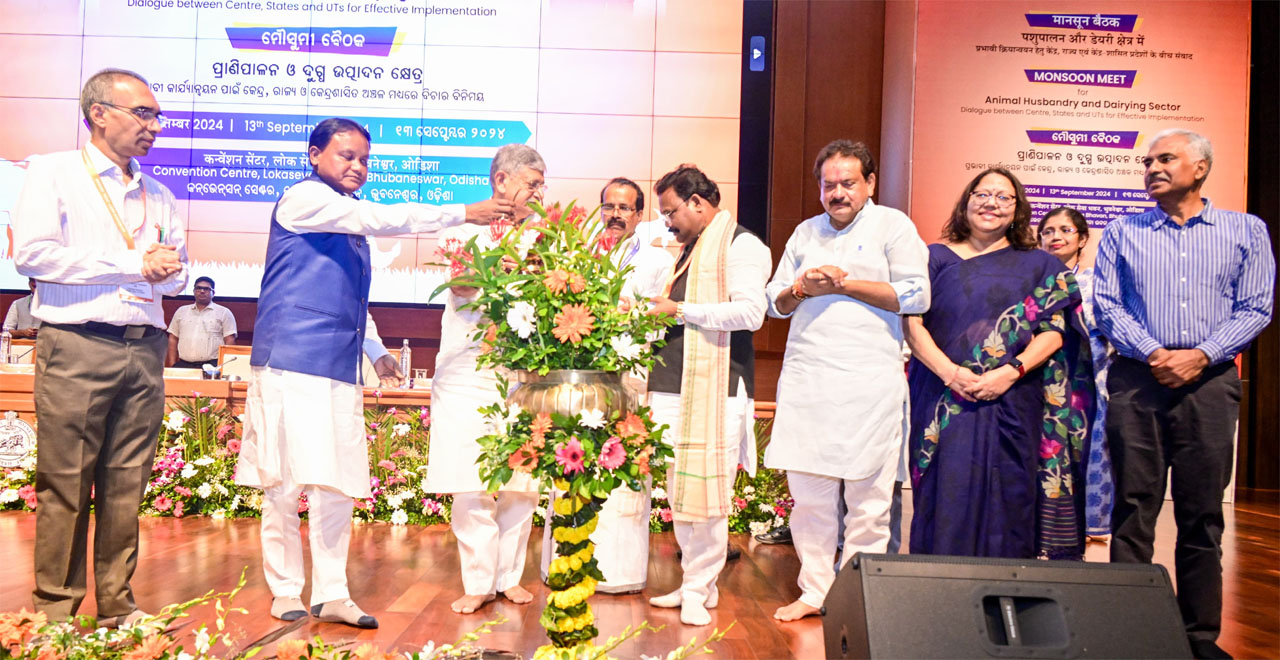Bhubaneswar: In order to boost up milk production, the State government has formulated a new scheme “Mukhyamantri Kamadhenu Yojana” with an outlay of Rs 1423.47 crore for five years under which there will be assistance for establishing small dairy units, provision of subsidized calf feed, increasing coverage under livestock insurance and strengthening dairy cooperatives.
Chief Minister Mohan Charan Majhi said this while addressing the Monsoon Meet 2024, hosted for the first time in Odisha by the Ministry of Fisheries, Animal Husbandry & Dairying, Government of India.
To strengthen the Poultry & small animal production, the State government has planned “Prani Sampad Samrudhhi Yojana”. With an objective of Holistic growth of the small animal sector “Small Animal Breeding Policy” is under preparation.
To further strengthen livestock health care, mobile veterinary clinics, the government has come up with GOMATA Yojana (Goal for Management And Treatment of Animals), he pointed out.
With an objective to foster a more compassionate and responsible approach towards stray & destitute animals a new scheme “Mukhyamantri Prani Kalyan Yojana” has been introduced, the Chief Minister said.
“We also plan to amend the Orissa Prevention of Cow Slaughter Act, 1960, with an objective to make it realistic with focus to reduce cruelty to animals, ” he stated.
Odisha will complete hundred years of its formation in 2036. Coincidently, it comes just eleven years before the goal of “Viksit Bharat, 2047”. Odisha will play a very important role in realizing the dream of Prime Minister Narendra Modi, he added.
Animal husbandry and dairy sectors are vital for India’s food security, rural development, and economic growth, Majhi said. He noted that animal husbandry and dairy sectors provide essential nutrients like milk, meat, eggs, and fish, meeting the dietary needs of a growing population. The dairy sector alone, he pointed out, contributes significantly to the national economy, with India being the world’s largest milk producer.
Animal husbandry also plays a crucial role in maintaining ecological balance and soil fertility, making it an integral part of sustainable agriculture.
The Chief Minister further highlighted that the significance of these sectors extends beyond economic benefits, as they also contribute to social and environmental sustainability.
He added that these sectors provide a source of income and employment for rural communities, particularly small and marginal farmers, tribal communities, and women. Furthermore, animal husbandry and dairy farming can help reduce poverty and improve livelihoods in rural areas, making them essential for achieving inclusive and sustainable development.
Shri Majhi stated that this meeting would provide a forum for sharing ideas and experiences, learning best practices from each other, and shaping a shared vision for a developed India (Vikshit Bharat) through collaboration and convergence.
He emphasised that the livestock sector is a key driver of growth in the agrarian economy, contributing around 30 percent to the agriculture Gross Value Added (GVA).
Shri Majhi expressed his gratitude to the Government of India, the Union Ministers, and the Department of Animal Husbandry and Dairying for giving Odisha the opportunity to host the “Monsoon Meet, 2024.”
He also extended his thanks to the ministers of all the states and Union Territories for attending the event. Majhi hoped that the discussions during the meeting would achieve their objectives, paving the way for progress, growth, and success.
Union Minister of Fisheries, Animal Husbandry, and Dairying, Panchayati Raj, Rajiv Ranjan Singh, Union Minister of State for Fisheries, Animal Husbandry, and Dairying, Prof. S.P. Singh Baghel, Union Minister of State for Fisheries, Animal Husbandry, and Dairying, George Kurian, and Odisha Fisheries & ARD Minister Gokulanand Mallik attended the meet.
National Dairy Development Board Chairman, Dr. Meenesh Shah, State Chief Secretary Manoj Ahuja, ministers of Animal Husbandry from various States and Union Territories, Principal Secretaries, Directors, and senior delegates representing the Government of India and different States and Union Territories, officials from the National Dairy Development Board, senior officials from State Governments, OMFED, scientists, and ICAR institutions were also present at the meet.


